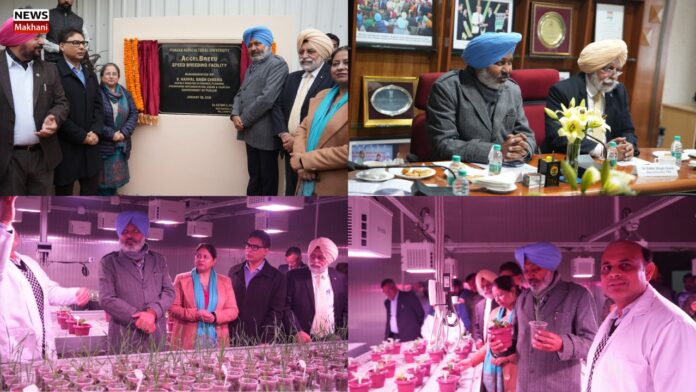Ludhiana, January 08, 2024
Punjab Agricultural University (PAU) marked a monumental leap in agricultural innovation with the inauguration of AccelBreed, a cutting-edge speed breeding research facility. Punjab’s Minister of Finance, Planning, Programme Implementation, Excise and Taxation, S. Harpal Singh Cheema, did the honours by unveiling the inscribed stone amidst a vast galaxy of university scientists and students. Other notable attendees were Dr. Inderjeet Singh, Vice-Chancellor of Guru Angad Dev Veterinary and Animal Sciences University, as well as MLAs Sh. Gurpreet Bassi Gogi, S. Daljit Singh Grewal and Mrs. Rajinder Pal Kaur Chhina, all Members of the Legislative Assembly, Punjab.
S. Cheema observed that the pioneering work showcased at the campus, particularly in the realm of Speed Breeding, is nothing short of remarkable. The ability to expedite crop generation cycles in research, achieve multiple generations annually, and significantly condense development timelines heralds a new era in crop breeding, he remarked. Commending PAU’s commitment to research and innovation, the minister viewed the establishment of AccelBreed as its dedication to leveraging state-of-the-art technology for the greater good. He called for collectively embracing its potential, collaborating, and innovating further. Together, we can pave the way for a future where agricultural abundance sustains and nourishes a growing global population, he added.
Emphasizing proactive measures to support farmers, S. Cheema suggested capitalizing on social media’s capabilities, distributing PAU farm literature to village libraries, collaborating with mandi stakeholders for crucial updates, and educating farmers on loan options and government schemes. Promising full backing for PAU’s infrastructure revival, he revealed ongoing government plans for significant university infrastructure enhancement within the next 2-3 years. He opined that a comprehensive strategy to support PAU would further empower farmers and elevate agricultural resources.
Dr. Satbir Singh Gosal, Vice-Chancellor of PAU, hailed the new speed breeding facility as a game-changer in addressing the challenge of feeding a projected 10 billion people by 2050. He considered AccelBreed not only as a symbol of cutting-edge research technology but also as a beacon of hope for agricultural diversification in Punjab. Underlining PAU’s innovative drive, he signaled speed breeding expansion from staples to sugarcane, potato and fruit plants, marking a paradigm shift in agricultural possibilities.
Shedding light on the facility’s pivotal role in expediting breeding trials for wheat, rice, brassica, pea, and pigeonpea, Dr. Gosal informed that the protocols developed at AccelBreed enable wheat to be harvested in just 60-65 days, a fraction of the traditional timeline. Similar protocols are being tested in rice, brassica, and pea. This breakthrough technique operates within controlled environments, surmounting seasonal constraints and enabling rapid development of superior crop varieties which can make global food security a tangible reality. Dr. Gosal also touched upon the university’s other new areas of focus like climate-resilient technologies, genome editing, biosensors, precision agriculture, Artificial Intelligence, IoT, etc.
Dr. Parveen Chhuneja, Director, School of Agricultural Biotechnology, detailed the speed breeding facility. She disclosed that funded by India’s Department of Biotechnology, AccelBreed spans 541.87 square meters and houses eight controlled chambers. It boasts fully automated systems meticulously regulating environmental factors, including light, temperature, and humidity, accelerating crop generation cycles to achieve 5-8 generations annually. With the capability to cultivate over 40,000 plantlets for research under optimal conditions, AccelBreed stands as a formidable asset, empowering PAU’s researchers to achieve substantial genetic advancements swiftly, marking a significant milestone in Punjab’s agricultural diversification efforts.
While welcoming the dignitaries, Sh. Rishi Pal Singh (IAS), PAU’s Registrar, gave a brief overview of the university’s rich legacy and its role in spearheading the Green Revolution. Dr. Ajmer Singh Dhatt, PAU’s Director of Research, delivered a comprehensive presentation on the university’s cutting-edge research technologies in diverse fields, including cropping systems, soil testing, conservation agriculture, agro-forestry systems, biofertilizers, pesticide residue analysis, micropropagation and more.
Dr. Makhan Singh Bhullar, Director of Extension Education, elaborated on the outreach programme of PAU that employs a network of Krishi Vigyan Kendras (KVKs) and Farm Advisory Services Centers (FASCs) in addition to several extension techniques and print, electronic and social media leading to a strong linkage with the farmers. Dr. Manav Indra Singh Gill, Dean Post Graduate Studies, explained the varsity’s academic programmes spanning across its constituent colleges that make the students future-ready. The vote of thanks was extended by Dr. Shammi Kapoor, Dean, College of Basic Sciences and Humanities and Comptroller, PAU.
The dignitaries were honoured with mementos and the Minister toured the labs of the School of Agricultural Biotechnology in the GS Kalkat Building. The programme was conducted by Dr. Vishal Bector, Associate Director (Institution Relations).

 हिंदी
हिंदी






